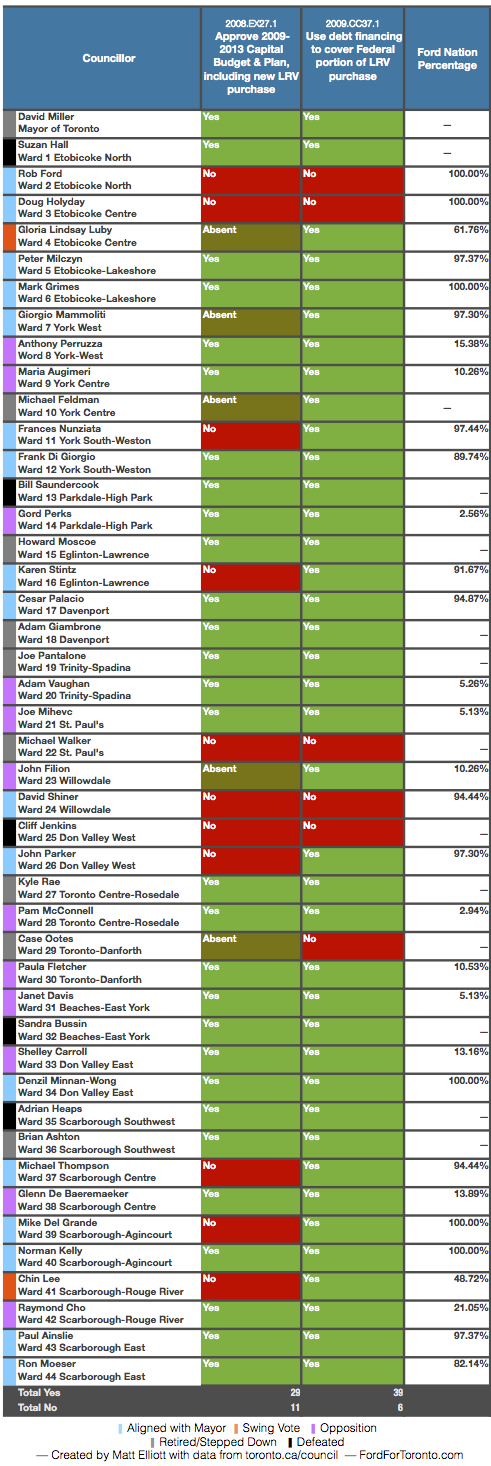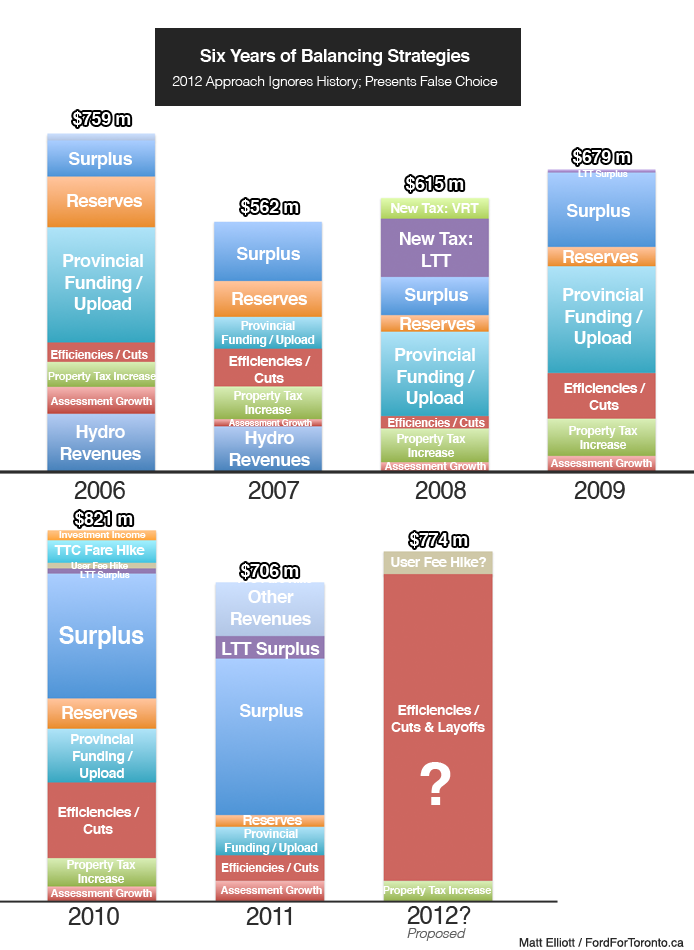The mayor, in his “Weekly Update” message, sent out the Friday before last week’s budget vote:
We are also going to take this year’s $154 million surplus and invest it vehicles for the TTC.
As I have said – the previous administration placed a $700 million order for TTC vehicles [new streetcars] with no money set aside to pay for them. That was irresponsible.
The $154 million surplus must go towards paying that $700 million debt as the bills come in. This is the responsible thing to do.
via My Weekly Report – week ending January 13, 2012 | Rob Ford’s Facebook.
This streetcar gambit was the second strategy the mayor’s team tried as part of their attempt to take back control of the 2012 budget narrative. In the face of an almost $200 million surplus, the whole “we’ve got to make a lot of cuts!” thing required some finesse. Their first idea was to frame any notion of using one-time “windfall” funds to maintain programs as totally and completely irresponsible. The kind of thing dumb consumers do.
That quickly fell apart, though, because the 2012 operating budget was always going to include so-called “one-time” funds. From the very moment Rob Ford stood at the podium and endorsed the staff-recommended budget, there was $80 million in non-sustainable reserve funds built right in. What became challenging for the mayor and his allies, then, was defending using some one-time funding but not any more than that.
They set an arbitrary line at $80 million but quickly realized they weren’t standing on solid ground. And so: streetcars.
Pointing to the streetcar purchase as part of the budget process was actually a shrewd move. It took something a lot of Ford opponents are passionate about — transit infrastructure — and dangled it precariously over a fiscal edge. The notion that the city might not be able to pay for its new transit vehicles if it didn’t devote more money to its capital budget at least had some logic to it. It gave proposed service cuts more legitimacy than they would have had otherwise in a budgetary surplus environment. We’re not cutting because we love cutting, they could say. We’re cutting to save transit.
All of this, of course, was mostly baseless scaremongering.
A brief history of Toronto’s streetcar purchase

David Miller's council voted to buy new streetcars twice. The first time, it was with the understanding that the federal government would cover a third of the costs. The second vote came after the federal government said no.
PART ONE: Having looked at various options for rebuilding the current fleet of Canadian Light Rail Vehicles (CLRVs) and and Articulated Light Rail Vehicles (ALRVs), the TTC decides that the best course of action is to replace the entire fleet with new streetcars. As an added bonus, the new vehicles can be made low-floor so they’re more accessible, theoretically lessening some of the demand on WheelTrans.
Leading into a design and tender process, the TTC includes 204 new streetcars in their capital budget request to council in 2008. The full cost is about $1.2 billion and the wording in the budget indicates that council’s approval is contingent on both the provincial and federal governments each paying one-third of that figure — about $400 million each. The City’s portion is to be funded with debt.
No one passes any amendments objecting to the purchase of new streetcars. (Though Rob Ford does attempt to pass amendments eliminating both 311 and Toronto’s bike plan.) The capital budget as a whole passes 29-11.
PART TWO: There’s no delicate way to say this: the federal government — through Conservative MP John Baird –, upon receiving Toronto’s request for streetcar funding as part of the 2009 federal stimulus package, literally tells Toronto to “fuck off.”
Yes, despite the province tabling no objections to funding its share of the vehicle purchase under its stimulus program, the federal government objects to paying for the purchase on a technicality and sends Toronto scrambling. At this point, the contract for the new vehicles has already been awarded to Bombardier and the clock is ticking before their bid — significantly lower than a comparable bid from Siemens — is to expire.
PART THREE: Council holds another vote to preserve Bombardier’s streetcar bid and keep things on schedule. The plan is to cover the federal government’s portion of the purchase price through debt financing. Room is made in the capital budget by deferring items like the Eglinton Bus Terminal replacement, the station modernization program and other capital projects. By doing things this way, the City is able to finance the purchase without increasing its net debt beyond what was originally planned and approved.
Council votes overwhelmingly to continue with the streetcar purchase, making the necessary changes to the TTC’s capital budget. The contract is signed with the first new streetcar set to debut in the city sometime in the next year or so.
Where we are today
As of this year’s capital budget, the streetcar purchase is still on the books, part of the ongoing capital plan that was approved by council last week. The only change is that the number of streetcars ordered was reduced from 204 to 189 as part of some cost-saving measures this past summer. The plan to use debt to finance the purchase won’t result in any kind of doom scenario, as the capital plan on the books keeps debt service charges below council’s self-mandated 15% limit. Even working from the almost stupidly conservative assumption that there will be no future surplus money or revenue from asset sales to devote to capital payments, the city has a fiscal strategy to meet its capital obligations.
That’s not to pretend that there aren’t serious issues related to TTC funding, however. Yes, the TTC has many capital needs beyond the limits of the approved capital budget. And, yes, they could absolutely use more funding to provide infrastructure to improve service across the city. There continues to be a need for all levels of government to sit down and figure out a long-term solution for transit infrastructure in this city.
But never in this budget process  — or in any other — was the city’s ability to pay for its new streetcars threatened. Following tales of $774 million deficits and 35% property tax increases, this was just yet another example of a mayor who tends to use fear as a means to build support for his agenda.
The streetcars we desire roll on.
